- Home
- John Barth
The Floating Opera Page 16
The Floating Opera Read online
Page 16
So. Nothing remains to be told of the affair, except that after its resumption it was conducted in a manner more satisfactory to me. No schedules, no demands, no jealousy, no fictions—all was spontaneity and candor. I think that my increasingly frequent impotency after that time (by 1936, about every fourth attempt at intercourse was a failure; by 1937, about every other attempt) would have led me to call off the thing for good in time anyway, even had I not resolved on this day to kill myself. But by 1937 I could contemplate with equanimity the prospect of terminating our affair, for it left, from my point of view, nothing to be desired. Jane Mack is the finest woman I’ve ever slept with. Since the morning of the day at hand, when she last left my rented bed, I have desired nothing from women. She satisfied me.
Now, if you’ll excuse me, I shall sleep.
XVIII. a matter of life or death
Although it was my custom to nap for an hour every day, on the day I intended to be my last I was waked almost as soon as my eyes were closed, by an urgent knock on my door.
“Come on in,” I called, and pulled a robe on over my underwear.
There was no response for several moments, and I had begun to decide that my unknown caller had gone away, when I heard two or three footsteps in the hall and then another knock.
“Yes, come on in,” I repeated, still tying my robe. Another pause. I started toward the door, but it opened just before I reached it, and Mister Haecker, taut as a piano wire, stepped inside.
“Sit down, Mister Haecker!” I exclaimed, for he looked ready to faint. His smile was thin and broken like the smiles of army recruits hearing heavy artillery for the first time, and his face was white. I took his arm firmly and led him to the chair. “Let me get you a drop of rye, Mister Haecker.” My first thought was that the old fellow was ill and had come to me for help.
“No thank you, Todd,” he managed to say. His voice I can describe only as a prim croak. He perched on the edge of the chair as daintily as a canary on its swing, and his hands clutched his knees.
“Is anything wrong, sir?” He looked a bit better now, but still none too stable.
“No,” he said shortly, closing his eyes and shaking his head. “No. I just—came in to talk to you, Todd.” He looked directly at me then for the first time, and gave me a quick, sick smile. I can recall smiling at my father in just that way once at some amusement park—Tolchester, perhaps—when he put me on a carrousel much too large, loud, and rapid for my tastes, and expected me to enjoy it as everyone else did. “Are you busy?”
“Busy loafing,” I said, and sat on the edge of the bed. “What’s on your mind, sir?” I offered him a cigarette, which he refused with a quick shake of his head, and then I lit one myself for a change.
“I daresay you’ll think me foolish, son,” he began, in a tone that I at once recognized as false—a deep, head-of-the-clan tone. “A garrulous old man, like many another.”
“Not unless what you say is foolish,” I said flatly.
Mister Haecker blushed—a surprising thing in a man seventy-nine years old. “It may well be,” he laughed nervously.
I smiled. “You don’t talk nonsense as a rule.”
Mister Haecker sighed, but his sigh was not spontaneous as his blush had been. And he glanced at me sharply.
“It’s a not uncommon thing for quite old men—men my age—to lose their perspective,” he observed. “I’m aware of that fact, and I often wonder whether we are always being fair when we call it simply senility.”
He paused, but I said nothing: I was waiting for him to finish tuning his piano.
“What I mean is, there are conditions of most people’s old age, other than mental failure, that could lead to the same crankiness, if you like. Disease, for example, or poverty, or isolation. Don’t you think?”
“It sounds reasonable to me,” I agreed mildly.
Mister Haecker looked relieved. “Now, then,” he said, “the thing I actually came down here for was this—” He clenched his lean fists on his knees and stared at them. “You must tell me frankly—I think you’ll be honest with me—did you think the things I told Captain Osborn this morning were entirely silly? You said you didn’t agree with me, I remember.”
To myself I said “Ah,” and regarded my visitor’s face more carefully, for the first note on the piano had been sounded. To him I said, “This morning? Oh, you mean the ‘growing old’ business.”
I’d hoped his question was merely rhetorical, an attempt to get himself going; but apparently he expected an answer, for he remained silent, a distracted look on his really quite distinguished face.
“Well, yes and no,” I answered. “If the idea you’re referring to is the one I’m thinking of, that old age is the glorious finale of life—the last of life for which the first was made, and all that—then I’d say yes, it’s possible that Cicero wasn’t just whistling in the graveyard. After all, a good Roman fell on his sword when things got too miserable; Cicero was famous and pretty well off in his old age, and probably got a toot out of being a public figure.”
“I believe he deeply loved life,” Mister Haecker remarked in another false tone, a ministerial one delivered with chin thrust out and head nodding gravely. “Every stage of it for its own peculiar virtues.”
“And I think the notion probably works for a number of people who actually believe in a hereafter, or who are honestly content with their careers, or who are temperamentally stoical.”
“I quite agree,” Mister Haecker said. “But you said yes and no.”
“That’s right. I think it’s silly to talk about what a man’s attitude should be, toward a thing like old age and death. Even if you start with If he wants to die content, you’d find that different people are content with different things. Cap’n Osborn, for example, will die content, I think; he’ll be having the time of his life cussing around his deathbed, and whipping his legs for turning cold.”
Mister Haecker clucked his tongue. “And what about me? I quite respect your opinion, Todd, as you should know. I’ve often wished I were your age”—he smiled ruefully—“or you were mine, so we could discuss things more freely. Intellectual discussion, after all, is the real joy of the winter of life, when other pleasures have flown, as it were.”
I spoke as gently as I could without defeating my purpose. “If I were used to feeling pity for people,” I said, “I think I’d feel sorrier for you than for anyone in this hotel, sir.”
Mister Haecker’s eyes grew panicky—their first really honest expression. “Indeed?”
“Don’t assault me when I say this,” I smiled. “I’m not by any means the truth-at-any-price sort. But since you asked, I’ll admit I consider your position the least enviable of anyone’s in the Explorers’ Club. Miss Holiday Hopkinson has been ready to die for so long, that when death actually gets to her it’ll be an anticlimax. That could lead to hysteria, like the kid who studies diving from books all winter and then gets out on the high board and forgets everything he learned; but probably it won’t. She’ll die in her sleep, I’ll bet. And Cap’n Osborn has known how he honestly feels about it too, for a long time, whenever he bothers to think about it, which is damned seldom. He’ll just put up a whale of a tussle when the time comes. But the trouble with you, sir, if I may say so, is that you’ve tried to pretend you’re enjoying yourself and looking forward to death as a grand finale, when actually you’re not.”
“Oh, that’s not so!” Mister Haecker protested.
“There’s nothing wrong with fooling yourself,” I said soothingly. “Lots of times it’s that or the insane asylum. But it doesn’t work if it doesn’t work. The trouble is that you’re not fooling yourself; you know very well it’s an act. What the hell’s glorious about your old age? What’s wrong with facing the fact that things are pretty bleak, and complaining like hell about it?”
When Mister Haecker slipped anger onto his face then, I began to weary of the colloquy and wish I were alone. Had he been sincerely angry I’d not have o
bjected, but his anger was another of his wardrobe of masks.
“You’re being quite frank, young man!” he cried.
“Forget I said anything, then.” I sighed, and stretched out on the bed in my robe and slippers. “All’s for the best in the best of all possible worlds.”
“I’m not angry at your impertinence,” he went on, “but I must say I’m disappointed in your values. They’re pretty commonplace, for you.”
I said nothing, and wished I’d said nothing from the beginning. After all, he was seventy-nine; even with his excellent health, he couldn’t be expected to live much more than ten years, and it was no special concern of mine whether he enjoyed them or not.
“Of course my career in the public schools wasn’t spectacular, if you judge it by promotions and the like,” he pouted. “And I shan’t deny that I’d be happier if my wife were alive, or if we’d had children—” He was watching himself being strong. He even paused before continuing in a firm voice, “—but she’s not, and we didn’t. Do you want me to go around in mourning, begging for pity? My friend Cicero has something to say about that, too: ‘In times like these, theirs is far from being the worst fate to whom it has been given to exchange life for a painless death.’ And this: ‘If she had not died now, she would yet have had to die a few years hence, for she was mortal born.’ What has happened has happened.”
Was there any reason to bother pointing out to him how directly his first quotation contradicted his whole position? I flipped my cigarette out the open window.
“Of all my acquaintances,” Mister Haecker went on determinedly, “I’d have expected you to be the first to recognize the happiness a mature man can get from a solitary old age, if he doesn’t act childish about it. After all the hustle and bustle, one is finally able to live in the company of his thoughts, and contemplate the beauty of God’s works. Isn’t that what all the philosophers wanted? I can understand Osborn not realizing it; good a chap as he is, the poor fellow hasn’t had the opportunity to educate himself. But you certainly must be aware that the life of solitary contemplation is the best—after all, you’re alone, too.”
“I do precious little contemplating,” I said. “And if I wanted to, I could chuck the whole thing tomorrow and get married. The point is, I’m here by choice. Also, I can’t quote you the lines,” I added, “but your pal Cicero wasn’t so enthusiastic about the contemplative life. He said somewhere that if a man could ascend into heaven all by himself and see the workings of the universe and so forth, the sight wouldn’t give him much pleasure; but it would be the finest thing in the world if he had somebody to describe it to. I’m not saying I believe any of this—I think all these generalizations are asinine. But you’re changing texts every few minutes.”
Another mask: Mister Haecker got up from the chair and assumed an injured tone. “I see I’m keeping you from your nap,” he said. “It took some courage for one my age to discuss these things with a young man. I thought you’d be interested in them.”
“You’re begging the question with that attitude,” I said, sitting up. “If there was any question. You asked me how I felt about it.”
“Well how do you feel?” he cried. “What do you want a man to do who doesn’t have anything to live for? It’s either pretend to be content, like a man, or go around wailing and weeping like a child.”
“I don’t care what anyone does,” I said. “It makes no difference to me, on principle, whether you’re happy or not. I’m no humanitarian. I only said I pitied you; I wouldn’t want to be in your shoes. But I don’t agree that the alternatives you just mentioned are the only ones.”
“What else is there?” Mister Haecker cried. He was getting worked up again, and his eyes, honest now, showed despair through any mask he donned. “Maybe you recommend suicide?” He laughed explosively. “Is that the other alternative?”
“It was for Cicero’s crowd,” I said. “Let me tell you something. Unless a man subscribes to some religion that doesn’t allow it, the question of whether or not to commit suicide is the first question he has to answer before he can work things out for himself. This applies only to people who want to live rationally, of course. Most people never realize that there’s a question in the first place, and I don’t see any particular reason why they should have it pointed out to them. I’m telling you because you asked me.”
“Well, I’m not a religious man,” Mister Haecker declared, “but I think that’s reason enough not to kill myself. If death is the absolute end, then you’re better off alive under any circumstances.”
“That doesn’t follow. If death is the end, then it’s neutral. Which is better, to be unhappy or to be neutral? It would be different if you could look forward to something better in the near future. I wouldn’t commit suicide, for instance, just because the Yankees lost a ball game.”
Mister Haecker stood rigid and pale, refusing to be entertained.
“You advise me to kill myself,” he said stiffly.
“Not at all. I didn’t say everybody should work out a rationale. But if you do, then you must answer the suicide question for yourself before you start, obviously. If you want to make sense, I’ve learned, you should never use the word should or ought until after you’ve used the word if.”
“Then if I want to live rationally, I should kill myself?” he asked, his voice a thin laugh.
“You should only think about the question,” I repeated. “Whether ’tis better in the mind to suffer…”
“Of course, Hamlet was either insane or pretending to be,” Mister Haecker remembered triumphantly.
“You’re evading the question.”
“How about you?” he snickered. “Have you thought about it? I see you’re still alive. Why is that?”
I smiled. “I promise I’ll think about it after supper tonight, and let you know tomorrow what I decide. You do the same, and we’ll compare notes and chip in for either a box of cigars or a pistol, as the case may be. But don’t forget,” I added seriously, “to consider every objection to suicide that you can think of. If you decide not to kill yourself, you can always change your mind later, but the other decision is hard to correct.”
Again Mister Haecker refused to be entertained.
“It’s a question of values,” he observed, “and life itself has a value, under any circumstances. There is an absolute value to human life that won’t be denied.”
“I deny it,” I said. Mister Haecker smiled grimly and went to the door. His eyes were still honest; he could do nothing with the fear in them, although he covered the rest of his features with a visionary false-face when he turned at the door and said, “Life, the simple fact of life, is good, young man. Life has intrinsic value.”
I was licking a cigar.
“Nothing has intrinsic value,” I remarked, as coolly as though I’d known it for years, when in fact that fundamental notion had just occurred to me, between licks. Mister Haecker closed the door, and I wondered why he’d come to see me; what exactly he’d had on his mind. If it had been some sort of confession, my reaction had driven him behind his masks. No matter: if now in protest against my ideas he actually began to believe his own, that was no concern of mine.
XIX. a premise to swallow
Quantitative changes suddenly become qualitative changes. From all of Marxism, which I once thought attractive enough, I find only this dictum remaining in the realm of my opinions. Water grows colder and colder and colder, and suddenly it’s ice. The day grows darker and darker, and suddenly it’s night. Man ages and ages, and suddenly he’s dead. Differences in degree lead to differences in kind.
When Mister Haecker had gone (Where? Up to his room, for another day of solitary confinement in the contemplative life), I donned my trousers, shirt, coat, and straw, and walked back through the great dry heat to the office. The sky was brilliant blue, the water likewise, a darker shade. Everything was still: only a few cars moved along High Street; no boats were visible on the river; the flag at Long Wharf hung
limply against its staff. Everything was baking in the enormous heat, which nevertheless drew not a bead of perspiration from my skin.
What was on my mind, as I walked, was the grand proposition that had occurred to me while I was licking my cigar: that absolutely nothing has intrinsic value. Now that the idea was articulated in my head, it seemed to me ridiculous that I hadn’t seen it years ago. All my life I’d been deciding that specific things had no intrinsic value—that things like money, honesty, strength, love, information, wisdom, even life, are not valuable in themselves, but only with reference to certain ends—and yet I’d never considered generalizing from those specific instances. But one instance was added to another, and another to that, and suddenly the total realization was effected—nothing is intrinsically valuable; the value of everything is attributed to it, assigned to it, from outside, by people.
I must confess to feeling in my tranquil way some real excitement at the idea. Need I repeat that I am not a thinker? That technical philosophy is not my cup of tea? Doubtless (as I later learned) this idea was not original with me, but it was completely new to me, and I delighted in it like a child turned loose in the endless out-of-doors, full of scornful pity for those inside. Nothing is valuable in itself. Not even truth; not even this truth. I am not a philosopher, except after the fact; but I am a mean rationalizer, and once the world has forced me into a new position, I can philosophize (or rationalize) like two Kants, like seven Philadelphia lawyers. Beginning with my new conclusions, I can work out first-rate premises.
On this morning, for example, I had opened my eyes with the knowledge that I would this day destroy myself (a conclusion in itself demonstrating Marx’s dictum); here the day was but half spent, and already premises were springing to my mind, to justify on philosophical grounds what had been a purely personal decision. The argument was staggering. Enough now to establish this first premise: nothing is intrinsically valuable.

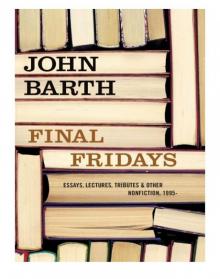 Final Fridays
Final Fridays Where Three Roads Meet: Novellas
Where Three Roads Meet: Novellas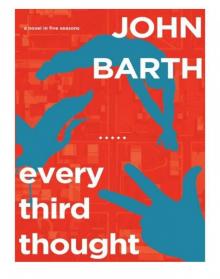 Every Third Thought: A Novel in Five Seasons
Every Third Thought: A Novel in Five Seasons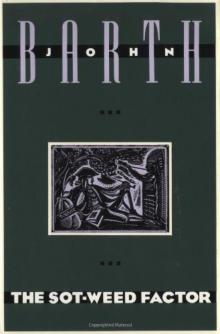 The Sot-Weed Factor
The Sot-Weed Factor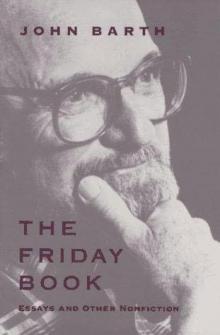 The Friday Book
The Friday Book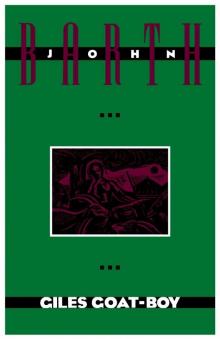 Giles Goat Boy
Giles Goat Boy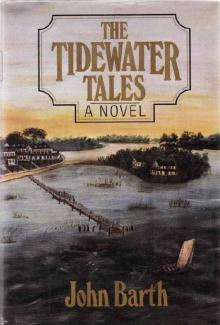 The Tidewater Tales
The Tidewater Tales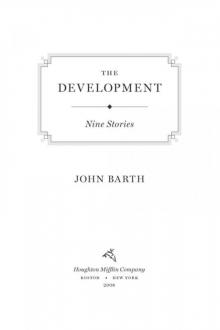 The Development
The Development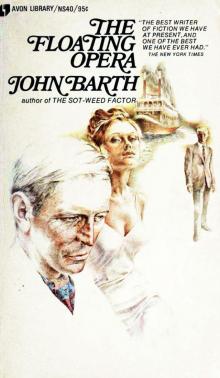 The Floating Opera
The Floating Opera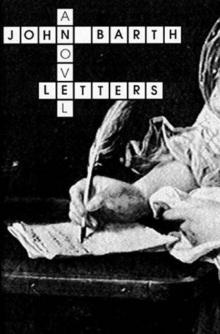 Letters
Letters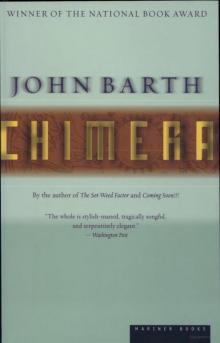 Chimera
Chimera Where Three Roads Meet
Where Three Roads Meet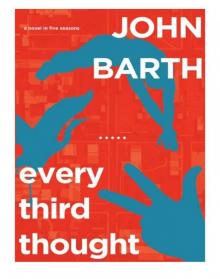 Every Third Thought
Every Third Thought